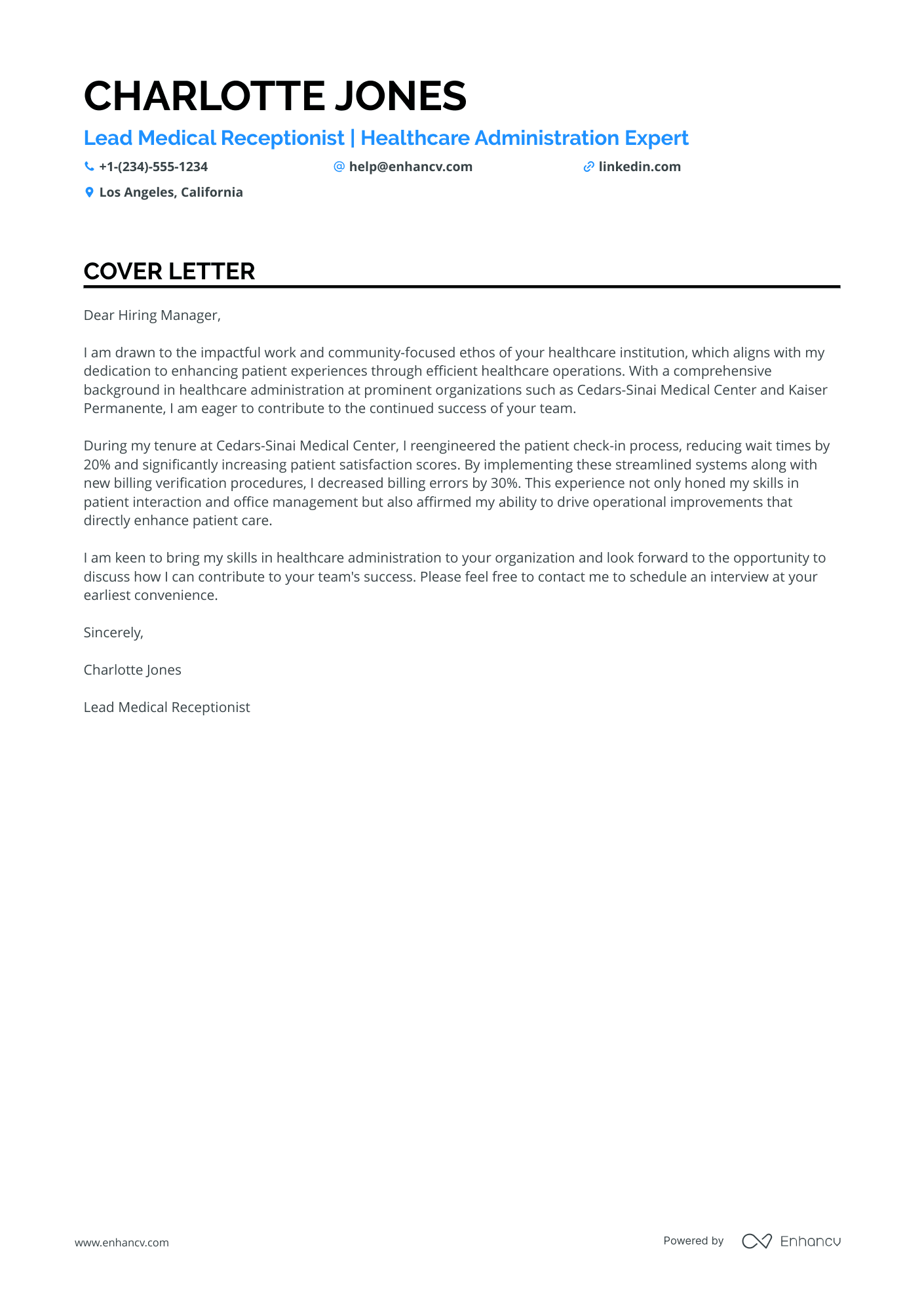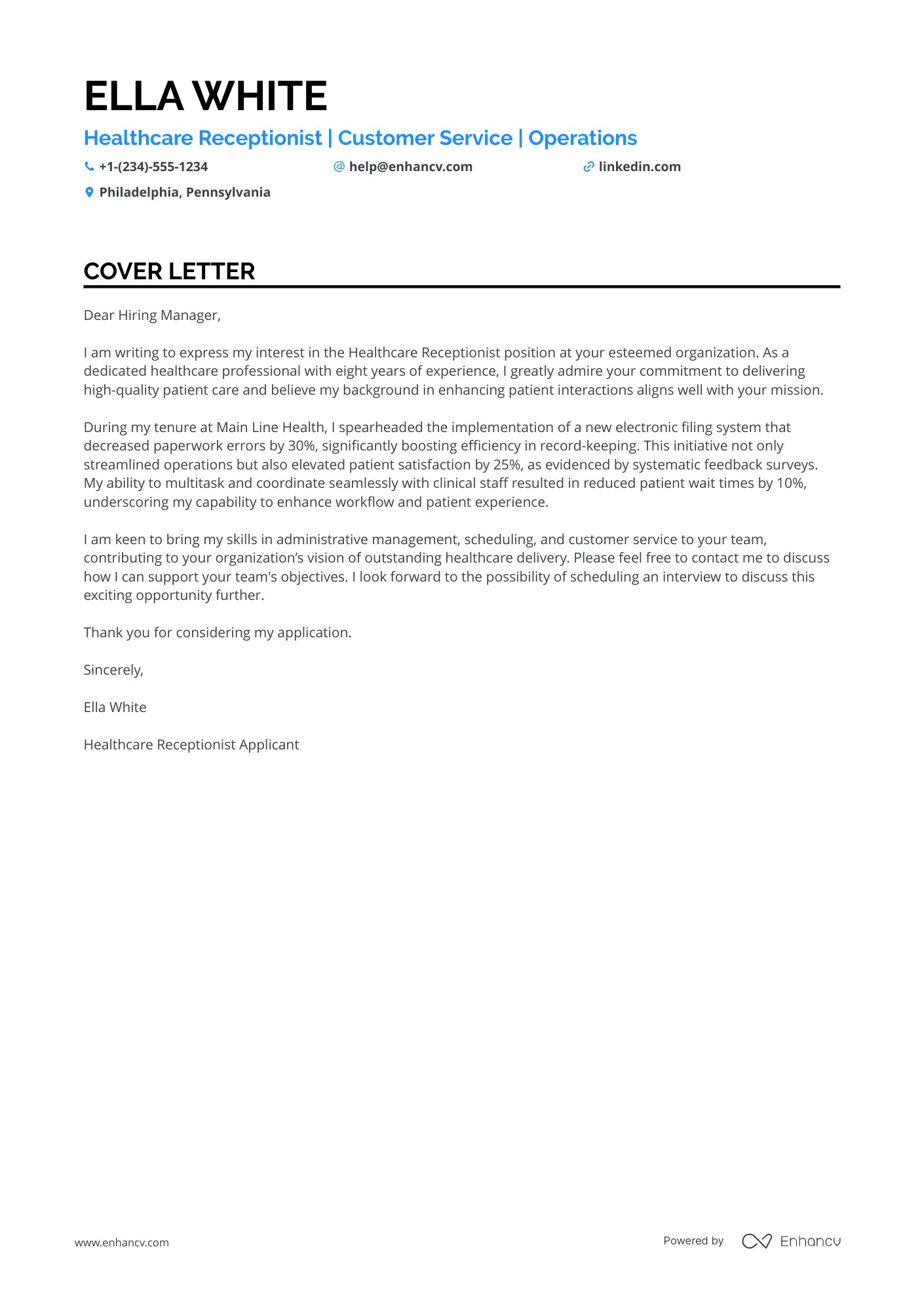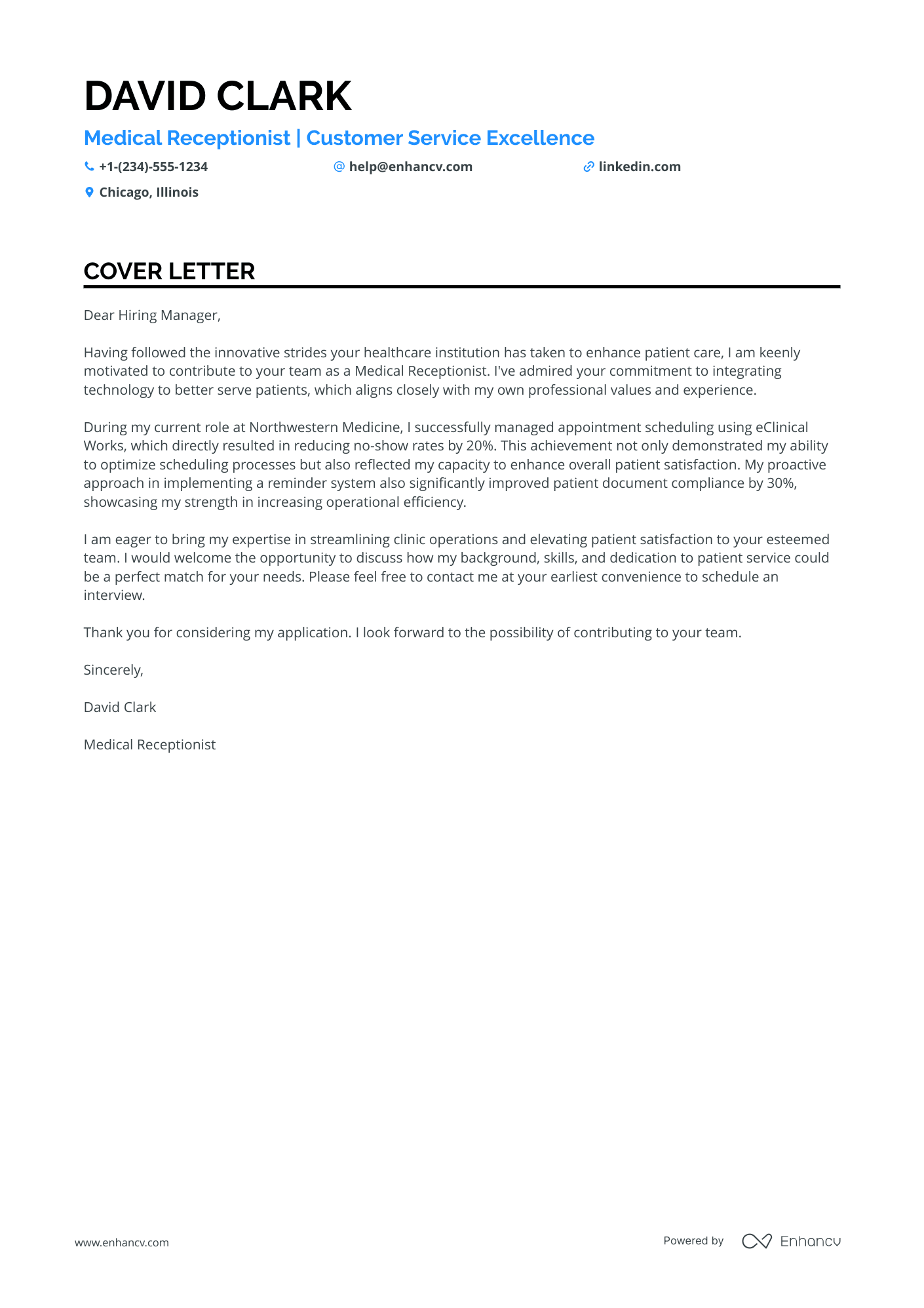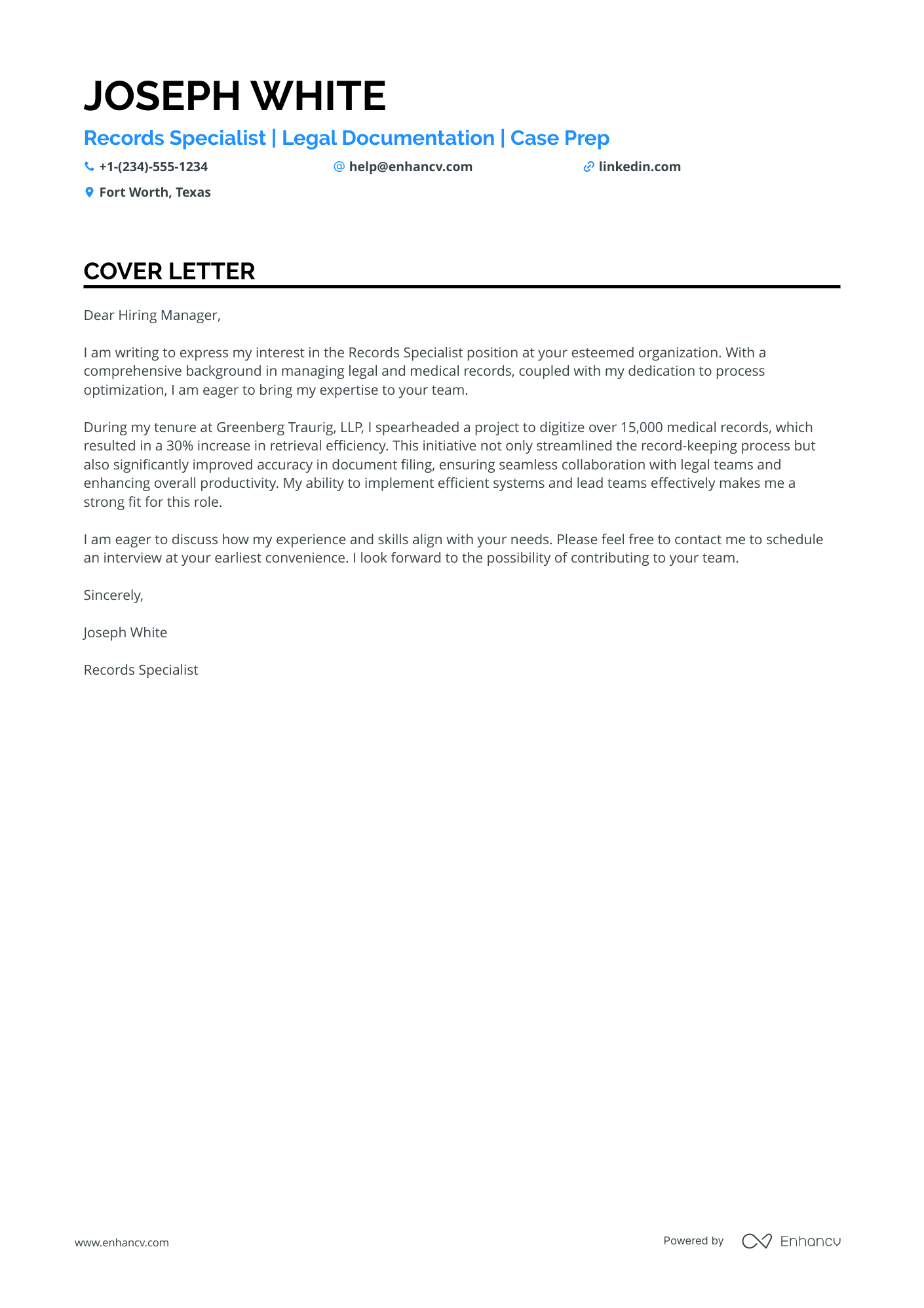Embarking on your job search, you've discovered that many medical receptionist positions require more than a polished resume; they call for a compelling cover letter. A cookie-cutter, cliché-filled narrative won't suffice. You must weave a concise, one-page tale that highlights your proudest professional achievement without echoing your resume. In this guide, we'll navigate the fine line between formality and originality, equipping you with the skills to craft a standout cover letter that leaves a lasting impression.
- Create a medical receptionist cover letter to persuade the recruiters you're the best candidate for the role;
- Use industry-leading medical receptionist cover letter templates and examples to save time;
- Dedicate your medical receptionist cover letter space to your best achievement;
- Make sure your medical receptionist cover letter meets recruiters' expectations and standards.
Avoid starting at the blank page for hours by using Enhancv's AI - just upload your resume and your medical receptionist cover letter will be ready for you to (tweak and) submit for your dream job.
If the medical receptionist isn't exactly the one you're looking for we have a plethora of cover letter examples for jobs like this one:
Drop your resume here or choose a file.
PDF & DOCX only. Max 2MB file size.
Medical receptionist cover letter example
Emily Johnson
New York, NY
+1-(234)-555-1234
help@enhancv.com
- Emphasizing relevant experience – The candidate mentions her role as Senior Medical Receptionist and the successful implementation of a new electronic health records system, demonstrating her capability and experience in managing healthcare administrative tasks.
- Quantifying achievements – The applicant quantifies her impact by stating the improvement in patient data accuracy and the number of patients served efficiently, which helps to substantiate her accomplishments and potential value to the employer.
- Aligning with the employer's values – By acknowledging the healthcare facility's commitment to patient engagement and care, the candidate shows that her values and objectives are in sync with those of her potential employer, signaling a good fit for the organizational culture.
- Call to action – The candidate closes the cover letter with an invitation for an interview, clearly stating her interest in discussion and further engagement, which is essential for progressing to the next step of the hiring process.
Structuring and formatting your medical receptionist cover letter
Here's what the structure of your medical receptionist cover letter should include:
- Header (with your name, the position you're applying for, and the date);
- Salutation (or greeting);
- Introductory paragraph (or your opening statement);
- Body paragraph (or further proof of your experience);
- Closing paragraph (with a call to action);
- Signature (that is optional).
Use the same font for your medical receptionist resume and cover letter - modern fonts like Lato and Rubik would help you stand out.
Your medical receptionist cover letter should be single-spaced and have a one-inch margins - this format is automatically set up in our cover letter templates and our cover letter builder.
When submitting your cover letter, always ensure it's in PDF, as this format keeps the information intact (and the quality of your document stays the same).
On one final note - the Applicant Tracker System (ATS or the software that is sometimes used to initially assess your application) won't read your medical receptionist cover letter.
Writing a cover letter is easy with our free cover letter generator. Make one in seconds from your resume.
The top sections on a medical receptionist cover letter
- Header: Containing the candidate’s contact information and the date, the header is crucial for the recruiter to quickly identify the applicant and facilitate prompt correspondence.
- Greeting: A personalized greeting to the hiring manager displays professionalism and attention to detail, which are key traits for a medical receptionist dealing with patient interaction.
- Introduction: The introductory paragraph should capture the recruiter's attention by briefly stating the applicant's enthusiasm for the role and their understanding of its importance in a medical setting.
- Body: This section should highlight relevant experience, such as managing patient records or handling scheduling tasks, that directly correlates with the responsibilities of a medical receptionist.
- Closing: The closing should reiterate the applicant's interest in the position and include a call to action, such as requesting an interview, which is indicative of a proactive approach – an essential attribute for someone in a front-facing medical office role.
Key qualities recruiters search for in a candidate’s cover letter
- Exceptional Communication Skills: Medical receptionists must communicate clearly and effectively with patients, healthcare providers, and insurance companies, often having to translate complex medical information into understandable terms.
- Patient Confidentiality and Sensitivity: Maintaining patient privacy is paramount, requiring an understanding of HIPAA regulations and the ability to handle sensitive information discreetly.
- Medical Terminology Knowledge: Familiarity with medical terms is crucial to accurately schedule appointments, process patient records, and communicate effectively with clinical staff.
- Multitasking and Organizational Abilities: Medical receptionists often handle multiple tasks simultaneously, like scheduling appointments, managing patient check-ins, and maintaining records. They must stay organized to ensure smooth operations.
- Customer Service Orientation: The role often involves addressing patient concerns and needs, requiring excellent customer service skills to ensure a positive experience and foster patient satisfaction.
- Technical Proficiency: Competence with healthcare software, electronic health records (EHR), and office equipment is necessary for efficient operations and record-keeping.
Greeting recruiters with your medical receptionist cover letter salutation
What better way to start your conversation with the hiring manager, than by greeting them?
Take the time to find out who the professional, recruiting for the role, is.
Search on LinkedIn, the company website. And for those still keen on making a fantastic first impression, you could even contact the organization, asking for the recruiter's name and more details about the job.
Address recruiters in the medical receptionist greeting by either their first name or last name. (e.g. "Dear Anthony" or "Dear Ms. Smarts").
If you're unable to discover the recruiter's name - don't go for the impersonal "To whom it may concern", but instead use "Dear HR team".
List of salutations you can use
- Dear Hiring Manager,
- Dear Dr. [Last Name],
- Dear [Clinic or Department Name] Team,
- Dear [Company Name] Recruiter,
- Dear [Job Title] Search Committee,
- Dear Ms./Mr. [Last Name],
Introducing your profile to catch recruiters' attention in no more than two sentences
The introduction of your medical receptionist cover letter is a whole Catch 22 .
You have an allocated space of no more than just a paragraph (of up to two sentences). With your introduction, you have to stand out and show why you're the best candidate out there.
Set out on a journey with your medical receptionist cover letter by focusing on why you're passionate about the job. Match your personal skills and interests to the role.
Another option for your medical receptionist cover letter introduction is to show you're the ideal candidate. Write about how your achievements and skills are precisely what the company is looking for.
However you decide to start your medical receptionist cover letter, always remember to write about the value you'd bring about. Making it both tangible (with your metrics of success) and highly sought out.
The middle or body of your medical receptionist cover letter body: a great instrument to tell a story
Now that you've set the right tone with the greeting and introduction of your medical receptionist cover letter, it's time to get down to business.
Hear us out, the body of your medical receptionist cover letter is the best storytelling instrument you have, in your job-hunting arsenal.
Writing the next three to six paragraphs, take the time to reassess the advert to discover job-crucial requirements.
Next, choose one accomplishment that covers those key skills and talents.
Use precisely that achievement to tell an exciting story of how you match the ideal candidate profile.
In the undertones of your story or medical receptionist cover letter body, hint at the difference you'd make and sell your application as the perfect one for the job.
A sincere and original way to end your medical receptionist cover letter
When writing their medical receptionist cover letter, candidates tend to use one of these phrases, "Sincerely yours" or "I look forward to hearing from you".
Both statements show good manners, but your cover letter should end in a more actionable manner.
Write about:
- how you see yourself growing in the role/organization;
- the benefits you would bring about (you'd impress even more with tangible metrics);
- the next steps in the process (provide your availability for interviews).
Is it beneficial to mention that you have no experience in your medical receptionist cover letter?
Just be honest that you may not have had roles in the industry, but bring about so much more.
Like, your transferable skills, attained thanks to your whole work and life experience (e.g. the skills your summer spent working abroad taught you).
Or, focus on what makes you, you, and that one past success that can help you stand out and impress recruiters (think of awards you've attained and how they've helped you become a better professional).
Alternatively, write about your passion and drive to land the job and the unique skill set you would bring to enhance the workplace culture.
Key takeaways
Turning your medical receptionist cover letter into a success is all about staying authentic to yourself and relevant to the job:
- Be creative with your medical receptionist cover letter introduction by stating something you enjoy about the company (that is genuine) or about your skill set (to get the recruiters' interested);
- Use single spacing and have a one-inch margin wrapping all around the content of your medical receptionist cover letter;
- Select just one past achievement from your career or life to tell a story of how you've obtained job-crucial skills and how they'd be beneficial to the role;
- The finishing paragraph of your medical receptionist cover letter doesn't necessarily have to be a signature but could be a promise of what you plan to achieve in the role;
- Instead of focusing on your lack of experience, spotlight your transferable skills, one relevant achievement, and career dreams.
Medical Receptionist cover letter examples
By Experience
Lead Medical Receptionist
- Highlighting Achievements: The letter effectively details specific achievements such as reducing wait times by 20% and decreasing billing errors by 30%, showcasing tangible results and impact.
- Alignment with Company Values: It emphasizes alignment with the institution's community-focused ethos and dedication to enhancing patient experiences, demonstrating cultural fit and shared goals.
- Relevant Experience: By mentioning experience at distinguished organizations like Cedars-Sinai Medical Center and Kaiser Permanente, the letter underscores familiarity with industry-standard practices and successful work environments.
Senior Medical Receptionist
- Quantifiable Achievements: The applicant highlights specific improvements, such as reducing paperwork errors by 30% and increasing patient satisfaction by 25%, demonstrating concrete results from their contributions.
- Relevance to Role: The letter emphasizes relevant skills for a Healthcare Receptionist, like administrative management, scheduling, and customer service, highlighting their direct applicability to the job.
- Alignment with Organization's Mission: The applicant aligns their experience and aspirations with the organization's mission of delivering high-quality patient care, showing a strong cultural fit and understanding of company values.
- Initiative and Problem-Solving: It showcases the applicant's ability to identify inefficiencies and implement solutions, such as the electronic filing system, highlighting initiative-taking and problem-solving skills crucial for the role.
Junior Medical Receptionist
- Demonstrating Alignment with Employer Values: The writer connects their motivation for applying to the role with the hospital's advancements in patient care, indicating a shared commitment to organizational goals.
- Showcasing Relevant Experience: Highlighting the use of specific medical scheduling software (eClinical Works) and quantifying improvements (20% reduction in no-show rates) reinforces the candidate’s practical, job-ready skills.
- Quantifying Achievements: By noting a 30% improvement in patient document compliance, the writer effectively uses data to prove their ability to enhance clinic operations.
- Proactive Problem-Solving: Introducing a new patient reminder system illustrates the candidate’s initiative and capacity for operational improvement, a valuable trait for the role.
By Role
Medical Receptionist Intern
- Specific Experience Highlight: The candidate emphasizes a quantifiable achievement by mentioning the digitization of over 15,000 medical records, which improved retrieval efficiency by 30%. Highlighting such accomplishments can demonstrate direct contributions and impacts in previous roles.
- Relevance to the Role: The letter directly connects past experiences at a notable law firm, Greenberg Traurig, LLP, with the responsibilities of a Records Specialist. This shows an understanding of the role's requirements and the ability to fulfill them.
- Proactive Initiative: By detailing an initiative the candidate led, the cover letter illustrates the candidate's proactive approach to problem-solving and process improvement, qualities valuable in a Records Specialist.
- Future Contribution: The candidate expresses enthusiasm about contributing to the potential employer's team, indicating a forward-thinking approach and eagerness to bring value to the organization.












